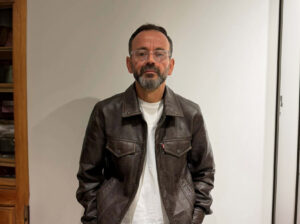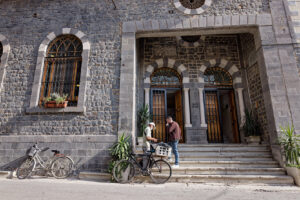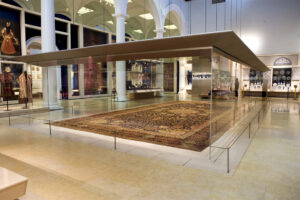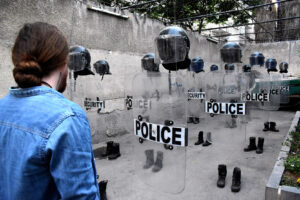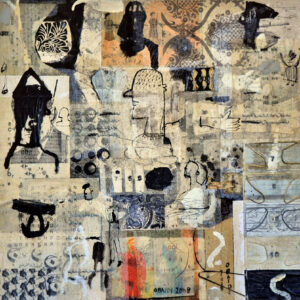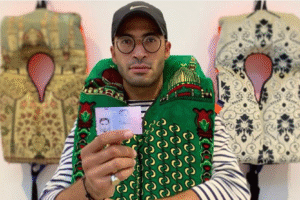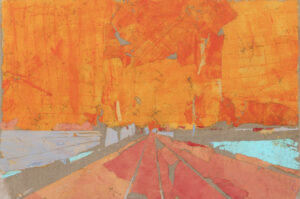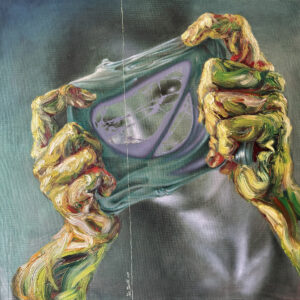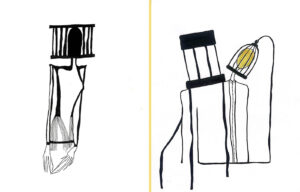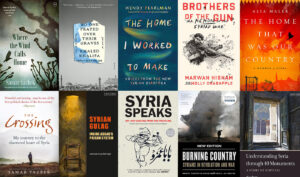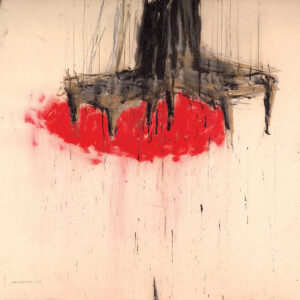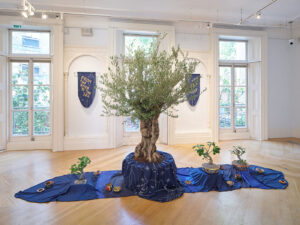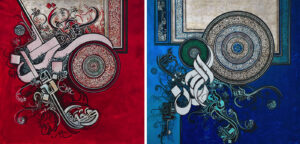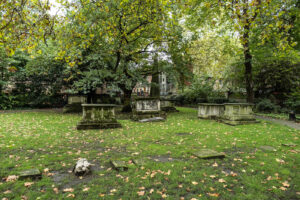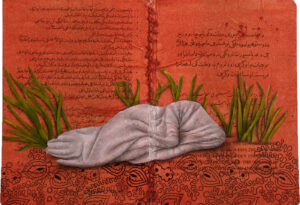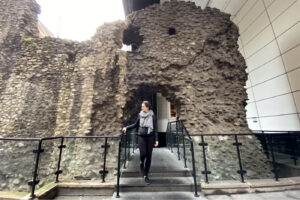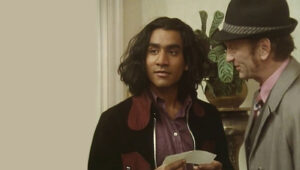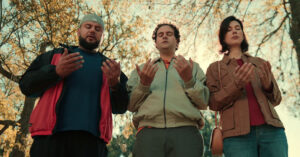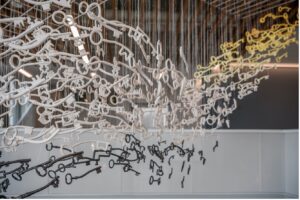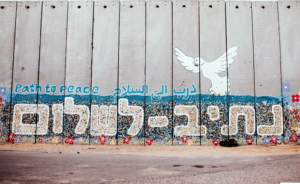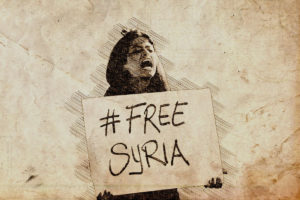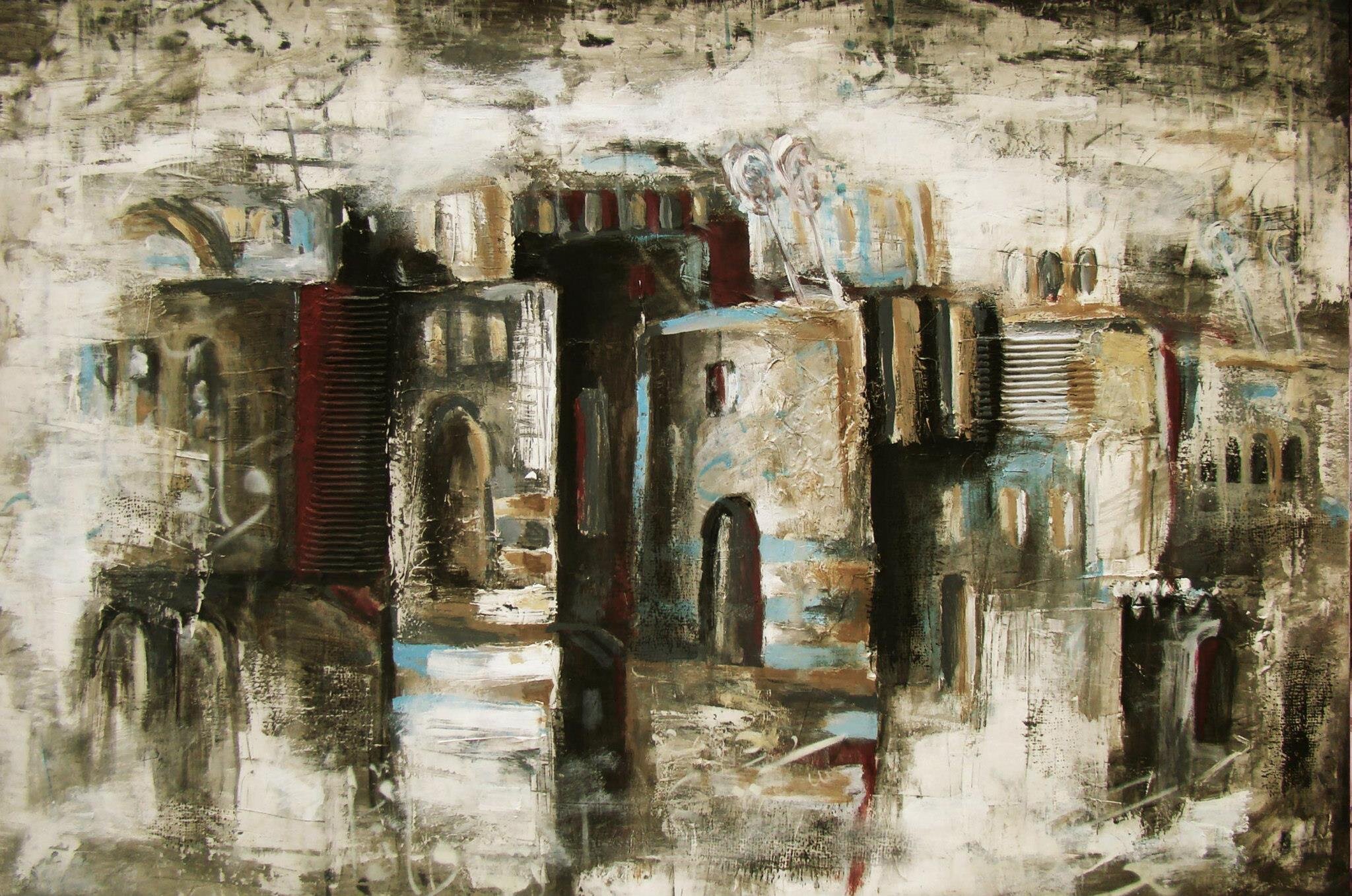
“Refugee Camp” by Syrian artist Besher Koushaji, 2012, acrylic on canvas (all artwork courtesy of the artist).
Frances Zaid
موعد (Maw‘id) — Date
The first text message I ever received in Arabic was you asking me out on a date. We’d met the night before at one of Mazen’s weekly parties in Yarmouk Palestinian refugee camp, the bustling square mile of tall cement buildings you called home. You came to sit on the empty chair next to me and said nothing, and I was struck by your strong but gentle presence, all sharp cheekbones and messy black curls, and I wouldn’t leave you alone.
I was watching a Syrian soap opera with friends from my London university when my phone beeped the next day. It was 2009 and we were Arabic students on our study year abroad — attempting to understand the high drama and heartbreaks of the Syrian musalsal was part of our homework. In my memory, we pause the TV and together pore over my phone to work out what you are proposing.
Your invitation was to Sidori, the bar where you had once had a job in the picturesque, ramshackle old city of Damascus. The mythology of our relationship has it that we talked for seven hours, me drawing the words I didn’t know in Arabic for you in my notebook. The bar emptied and the barman, your friend, fell asleep, and you put Pink Floyd on the stereo and went behind the bar yourself whenever our glasses needed more beer.
الحنين (Al-Haneen) — Nostalgia
I wish I could write about Syria without nostalgia. Our days were as dulled with boredom and mundane distractions as the day in which you are reading this.
Nostalgia makes it seem like the war was always going to happen.
طيارة (Tayyara) — Aeroplane
The plane that took you from Damascus to London was the first you’d ever been on. It was November 2010, and, a year after our raucous wedding in Yarmouk, you finally had your British visa.
You drank a glass of wine at ten in the morning and took photos of the clouds with our silver, pre-smartphone digital camera.
It’s good to be in the sky after 25 years just looking at it, you said.
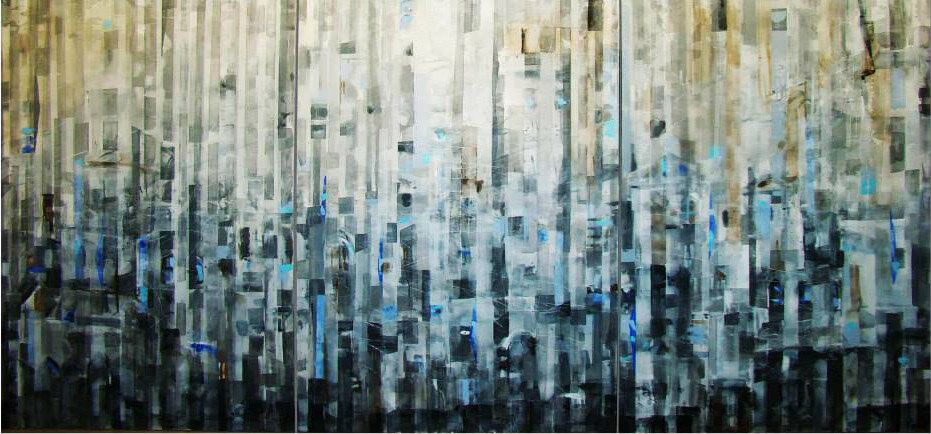
“The Wall” by Besher Koushaji, 2014, acrylic on canvas.
كنباي (Canabay) — Sofa
Your family living room in Yarmouk had two sofas and three chairs, all in matching blue floral upholstery with wooden scrolls curled at the front of the armrests. The seats hosted aunties, uncles and neighbors on a daily basis, on whom your mum would press individual plates of fruit and small glass cups of sweet, steaming tea.
In 2009 and 2010 I spent many hours on those sofas, trying to follow conversations between assembled relatives about politics or home decor, or grinning shyly at gatherings of your mum’s friends.
Memories from that flat: Your dad playing Solitaire on the big white PC in the living room. Your youngest sister Hanan performing her rap compositions, notebook in hand. 13-year-old Shams writing the names of her siblings on their bedroom wall, how pleased I was that she’d included mine.
Your family fled Yarmouk in 2012 following an airstrike, after which the camp was occupied by opposition fighters, and put under government siege. In November 2018, six years since they had last seen their home, your dad posted a video to the family WhatsaApp group. He’d been back to the flat.
Following a blockade that had killed around 200 people, many from starvation, the Syrian authorities were letting some people return to Yarmouk to see their homes. The streets were unrecognizable to the point where your dad, who had lived there all his life, could barely find your building. What had once been home now looked like a stock image of modern war, shells having ripped the fronts off houses, reduced others to rubble.
Your flat had got off relatively lightly — “just” a couple of holes through a kitchen and bedroom wall. But most of the furniture had been taken, and everything else was strewn wildly across the floor (except for your mum and dad’s clothes, which still hung, implausibly, in their bedroom wardrobe). Even the toilets and electricity cables had been ripped out and removed, a final face-kick to anyone who might think of return.
Children of the Nakba generation that was forced to leave Palestine in 1948, your parents had built their home in Syria from nothing, a place that was theirs in a country that wasn’t. Every brick had been an effort, and represented a small victory over erasure. These walls were what they had.
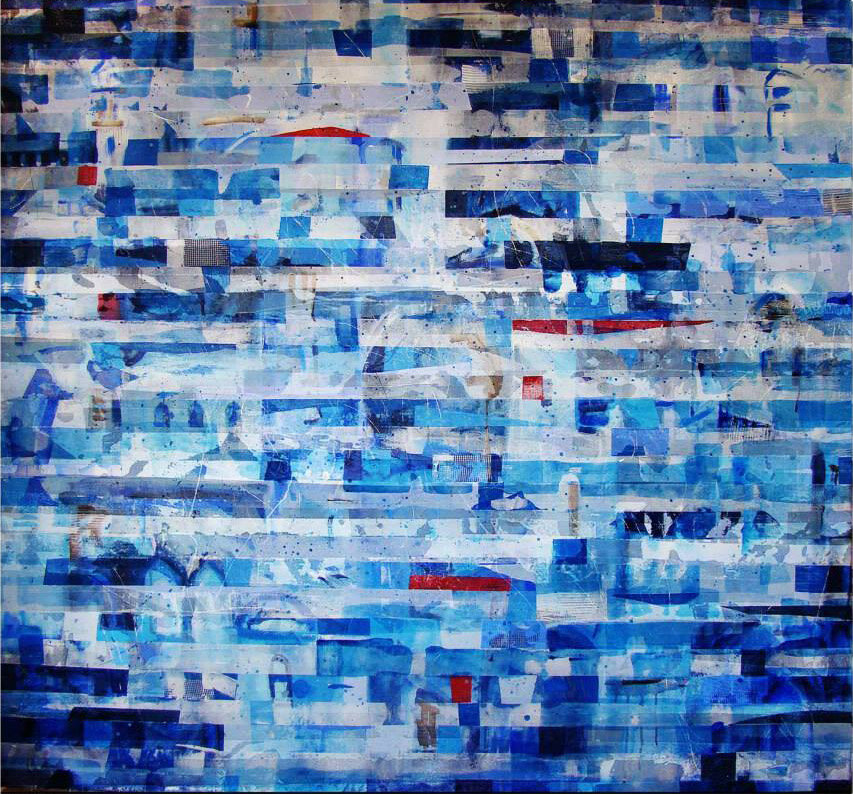
“Untitled”, Besher Koushaji, 2013, acrylic on canvas.
“Ma fi shi,” it’s nothing, your dad incanted over and over as he moved through the ransacked flat, naming the rooms: living room, bedroom, kitchen.
Later, men from the army came to take the washing machine and fridge, and a neighbor sent a photo that made me cry: your family sofa on the back of a soldier’s motorbike.
حمّام (Hammam) — Bathroom
I always loved, in the camp, how your mum would turn the hot water on and we’d all have a shower one after the other, and each sweet-smelling, towel-wrapped figure to emerge from the bathroom would be greeted with a collective “na’eeman,” which you always translate as “heavenly” and is what you say in Arabic when someone has undertaken the renewing ritual of becoming clean.
6 June, 2012, Whitechapel, London: You sprang out of the bath when you heard a noise —you’ve been following Syria’s bombs and bullets so closely you’ve forgotten you aren’t actually there. The bang turned out to be my hairbrush falling from the side of the bath onto the floor.
عيلة (‘Aileh) — Family
Once, when I was homesick during my year in Damascus, you went out and bought me my favourite foul medammas beans with hot garlicky yoghurt, a banana milkshake and some hairbands with big plastic strawberries on them, and promised to do impressions of the family members I missed whenever I felt sad.
Today, in the midst of all your other losses, I sometimes forget you haven’t seen your mum or dad for nearly nine years.
عيد الميلاد (Eid al-Milad) — Christmas
My family has a tradition that each festive season, we dress up as something beginning with a given letter from the word ‘Christmas’, spelling it out as the years go by. It started the winter we found out Hassan had been killed, and we didn’t feel like dressing up, so we just wore red jumpers and stood side by side with our arms out, saying we were C for the Central Line.
درس (Dars) — Lesson
According to an old notebook from my year in Syria, on 9 May 2009 I decided it was important to teach you the following:
1. Almaza [Lebanese beer] makes me piss a lot
I’m going for a piss
2. I am pissed off (with…)
He pissed me off
3 Are you taking the piss (out of me)?
4. I got really pissed last night
5. Piss off!
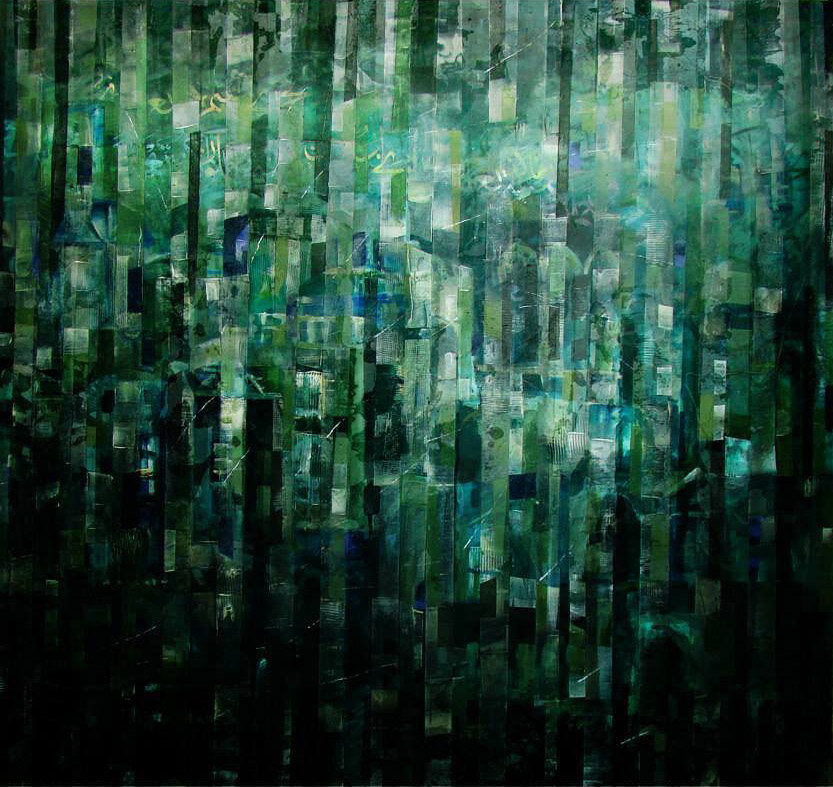
“Untitled”, Besher Koushaji, 2013, acrylic on canvas.
(In brackets are uses I presumably considered less vital for survival in the UK: long thin streak of piss, piss-poor, piss-easy/piece of piss)
مطرقة (Matra’a) — Hammer
A Jamaican man, a Palestinian man and a British-Pakistani man were working on a roof in North London.
Sometimes, when the Palestinian man was down on the street and didn’t know the English name of the tool being requested from the roof, the Jamaican man and the British-Pakistani man would get out a big piece of card and draw it for him.
You have seen sides of England I will never see, like how you say “yes bro” to the 15-year-old driving a flashy car down Bethnal Green Road, and I say “who was that?!“
شهيد (Shaheed) — Martyr
I was at the office of the migrant support center where I worked when I found out Hassan was dead. I had logged onto Facebook to post something to the center’s page, and the photo of him staring back from my feed could only mean one thing.
It was December 2013, and your old friend had been missing for months after being taken at a checkpoint while trying to escape besieged Yarmouk. We learned he had been taken to a regime prison and killed under torture.
Hassan was an actor and filmmaker who was documenting with his camera the horrors unfolding around him, as well as sending them up in a series of fearless comedy sketches.
Soon, photos of him would be overlaid with the word shaheed, martyr; even the funny ones, like the one where he’s leaning on a tall stick in mock seriousness, one eyebrow raised to the camera, during a trip to the countryside with you and the lads.
I regret that this story is the only time I ever say Hassan’s name.
When I first met him, while walking with you through the noisy streets of Yarmouk, he introduced himself, laughing, as “the Al Pacino of the camp.”
أخبار (Akhbar) — News
You sit on the sofa with your left foot resting on your right knee, the reflection of our net curtains sliding across the screen of your phone as you scroll through the news.
If I ask you what’s happening in the world, you will say only “nafs al khara,” same old shit.
You have tried to keep me separate from the darkness beneath the surface, and I have let you, probably too much.
سترة نجاة (Sutrat Najaat) — Life Jacket
A blue dot nudged its slow way across three centimeters of toughened glass. It was November 2015 and we were up late in our East London flat, witnessing an event we had been anticipating for months: your brother and two youngest sisters crossing the Aegean Sea in a rubber dinghy. They hoped to make it from the Turkish coastal town of Didim to the tiny, uninhabited Greek island of Farmakonisi, from where they would travel to mainland Greece and then northwards through Europe to start new lives in Sweden, two thousand miles from the parents they had left behind in Damascus.
Tucked under the covers, we stared at the map on your phone, holding our breath as the spot your siblings occupied on the earth’s surface inched further and further away from dry land. Their new friend Bilal had made a WhatsApp group for the worried families of his fellow passengers, and sent us reassuring communiques as the boat sliced through the water: “The sea is calm, the driver’s as good as they come!”
Your siblings were not calm. This was the moment — more than when they ran across the Syrian-Turkish border, phone numbers and bank notes stuffed inside their shoes; even more, perhaps, than when shells had leveled nearby buildings or exploded the ground they’d just been standing on — when dying was a clear and undeniable possibility. We were right there in death’s open mouth, your brother Wa’el would later say of being in the sea. The lives of friends and neighbors had ended here, in terror, water on every horizon.
The girls, Shams and Hanan, had slept the night before they left, but Wa’el had not. He was wondering what configuration of his arms and legs might keep both his sisters’ bodies above water, should the dinghy tear and sink. He was thinking about the words of the man who had sold them their life jackets: “These ones are great, they can keep you afloat in the sea for twelve hours!”
Yet at the same time, the first touch of the cold, salty water brought a strange kind of peace. With its object up close, the fear lost its sharp edges: whatever happened, when they stepped onto that boat, this chapter would be over. The smuggler ordered them to sit still, so they didn’t move, and Shams began to pray and pray and pray.
Miles away in England, my granny and her brother, my great uncle, also prayed. They had never met Wa’el, Shams or Hanan, but regularly asked for updates on their journey out of Syria, which they shared with friends who were also praying for the group’s safe arrival.
It was only after meeting you that I realized that, having grown up in 1930s Britain, my grandparents and their generation are also survivors of war. They know what it means to be separated from family, how it feels to hide under the stairs as planes empty their metal bellies overhead. I was grateful they were with us as your siblings braved the faceless sea, and glad some of us still believed in God.
When the blue dot touched Farmakonisi’s eastern edge, we dared to breath out. White flames flickered on the shore, bonfires lit by those who had already made the crossing — men and women who cheered and shouted “WELCOME! WELCOME!” as the dinghy approached, running out in their dozens to help. For your brother and sisters and everyone on that boat, this arrival would mark the dawn of as yet unforeseen battles, the birth of new losses. But at that moment, on a tiny Greek island and in our bedroom in Bethnal Green, it felt like the end of something.
ضايج (Dayej) — Angry
An incomplete list of things we have hurled or punched in a rage over the past ten years:
· Laptop – you
· Metal pedal bin – you
· Highchair (empty) – you
· Sky blue cereal bowl – me. I remember looking at it in the split second beforehand to judge whether or not our landlady would miss it, and deciding it was replaceable before smashing it onto the dining table.
بِنتنا (Bintna) — Daughter
Somewhere between the urge to speak and having something to say lives our daughter Maha. She is three, the age when words do a final dance before resigning themselves to convention; when the end of the sentence sometimes forgets what the start is doing:
My nose is hurting because you’re talking so much!
BYE! I’ve just got a few more minutes on here and then I’ve got money.
This is a big house called of bricks.
Where’s no? Is no in the cupboard? No.
BYE! I’ve got so much plasters today.
I like doing a douche when I’m smaller, out the world.
She is a bell, constantly pulling us back to the present.
الله (Allah) — God
28 April, 2018, Tulse Hill, London
maybe second time in my life
I see you cry
sitting at the window with
your bluetooth speaker
on the kitchen table
delivering to our quiet
Sunday evening living room
the voice of a guy
you know in Yarmouk
a young man
still there,
as the bombs shake the earth
and his friend has recorded the call
and you can hear the world
exploding as he speaks
in that Arabic way
where your words are
the opposite
of what your voice is
saying
thank God, we’re fine
thank God
thank God
God is great
God is great
God is great
until the words can’t
hold him up any longer
and he’s sobbing
God is great
God is great
God
is great
نوم (Nowm) – Sleep
I can sleep and you can’t. Sometimes I think this is the fundamental difference between us.
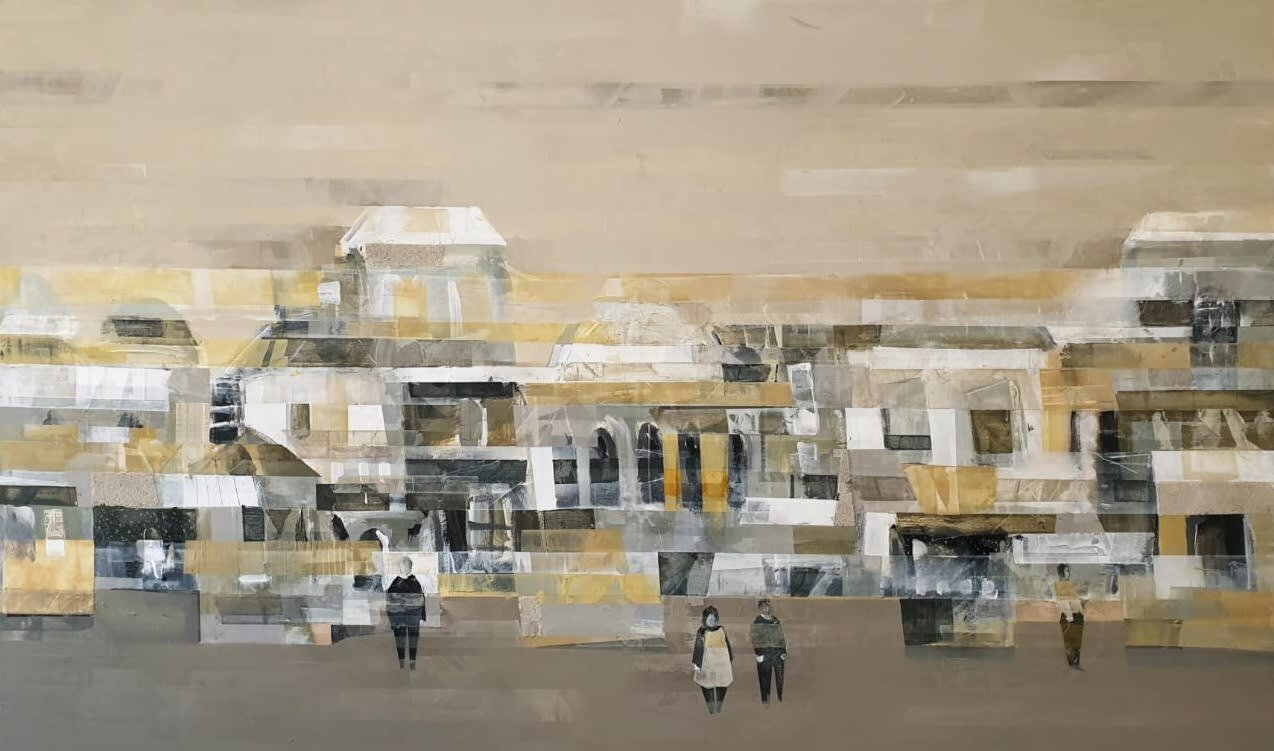
“Untitled”, Besher Koushaji, 2020, acrylic on canvas.
صور (Suwwar) – Photos
25 July, 2017, Campen, Holland
On a silent balcony at midnight we sit with an old friend, and dive through a laptop screen into the past:
Two brothers and a sister under rare Damascus snow. Backflips into a sun-bleached swimming pool in the camp. Sweat-drenched weddings and arak-drenched evenings. Look how young we were, look how young we were…
All of the guys in this picture are dead. Young men, briefly pausing their lives for a photo they will soon forget. Holding each other’s shoulders in that unselfconscious way Arab men do, never expecting to be more than a touch away.
ولادة (Wilada) — Birth
I let it wash over my back, hips and belly like a wave,
breathed
I can smell the flowers
I can see the sky
I hugged the wall
in pain
put my cheek
to the cool, white paint
Snow over everything
Sun on the horizon
Then the relief of warm water
and the irresistible, unbearable urge
to turn myself inside out
*
The lights came back on
and in my arms
our son
(Afterwards, on the sofa, you forked egg and spinach into my mouth as I fed Sa’eed, and I was a husk, awash with relief, and there was pleasure in every little thing).
ضحك (Dohk) — Laughter
6 July, 2012, Kilburn, London: Spent the evening drinking wine and smoking and discussing the fate of the poor stoners in Syria who can’t get any weed now no-one’s buying it in from Lebanon. We decided to form an international humanitarian organization, like Médecins Sans Frontières, to get hash into the troubled areas, by air drop if necessary.
20 August, 2018, Uppsala, Sweden: Wa’el described the humiliation of waiting in line for blankets in Damascus while one of the distributors filmed them on his phone. But there were funny moments too, like cousin Ahmed asking him what color blanket he’d like, then folding it up with painstaking precision while the waiting crowd shouted at their backs.
السويد (Al Sweyd) —Sweden
Sweden is the nearest we get to going back. Your three sisters, brother, nieces and nephew live there among a large community of people from Yarmouk, and it’s the place where we eat bitter Middle Eastern olives and rosewater-scented kanafeh, speak Arabic and feel closest to “there.”
Every time we visit Helsingborg or Uppsala, the reality of the war knocks the breath out of me. It’s a topic of everyday conversation, talk of torture and drowning and bullet wounds all mixed in with the olive oil and cigarette smoke and discussions of what we’re having for dinner. An old neighbor is mentioned and someone says “he’s dead, right?” and you don’t even have to look up from your phone.
I remember once seeing a clip of a woman who’d just learned her friend, American activist Rachel Corrie, had been crushed to death by an Israeli tank. The woman’s scream was so ear-splittingly, unbearably raw that you felt a bit of her flesh had just been stripped away.
I guess once you’ve lived through long years of war, the wound has been re-opened so many times that the pain no longer shocks, but lies pulsing and deep, buried behind stoned or sleep-deprived eyes.
بيت (Bayt) — House, or home
I don’t know if it’s entering my thirties, or having kids, but I’ve finally realized that the world is beautiful. Sunlight at dusk, branches in slow motion, the plastic slapping sound of a fountain. It is as if a layer has been stripped away, and there are trees where once there had been only houses.
I used to think it was indulgent to enjoy nice things, in a world of so much pain. You could call it middle class guilt. You have helped me learn to enjoy the present. To cherish what we have, even if we don’t deserve it any more than those who are without.
We recently moved back to Birmingham, my hometown, and we have a garden for the first time. It’s already alive with new things you have planted: young shoots of parsley and spinach pushing through the earth, hanging baskets exploding with indigo and ochre.
Unlike me you have always had green fingers, nurturing a growing collection of houseplants as we moved through endless flats in London, and now you’re in your element, your leafy friends coming second only to your children. You often arrive home bearing new potted plants or packets of seeds, and the progress of your roses is the topic of daily discussion.
You’re in the garden right now, steadying a watering can with Maha, inviting her to touch the clusters of small, shiny leaves. The water runs out and she shouts in Arabic “kaman wallah!” — more please! — and you ask if she wants more water in the can, and she jumps up and down and cries in English “YES! YES! I DO!” and you both come inside to fill up.




